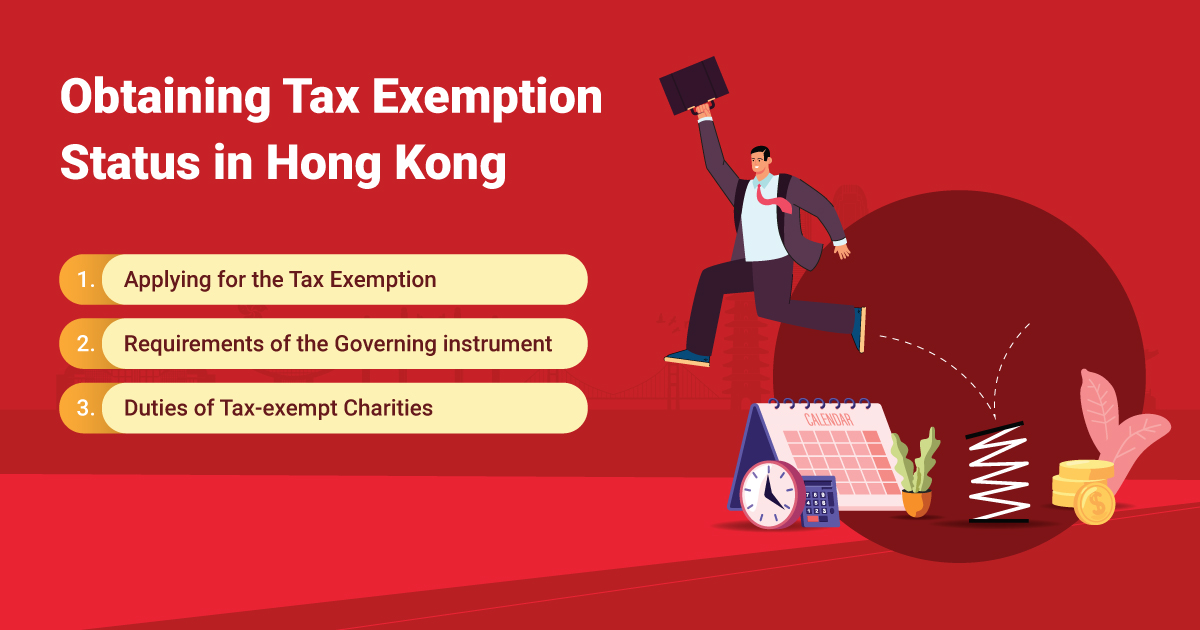
Section 88 of the Inland Revenue Ordinance (IRO) granted charitable institutions tax exemption status that excludes them from the business registration fee to the stamp duty on transfer of any immovable property. It also enables tax-exempt charities to issue donation receipts for donors to claim tax deduction under the IRO. Do you have plans to set up a charity in Hong Kong? Read on to find out how you can obtain tax exemption status in Hong Kong.
Related Read: Guide to Taxation in Hong Kong
Contents
Process of tax exemption status application in Hong Kong
1. Applying for the Tax Exemption Status
In order to successfully acquire tax exemption status, the charity organisation is required to submit an application letter seeking recognition of tax exemption status to the Inland Revenue Department (the “IRD”), as well as preparing the following documents.
For established organisations:
- a copy of the relevant certificate of registration
- a certified true copy of the instrument and rules governing its activities, i.e. the Articles of Association in the case of a limited company
- a list of any activities which have been carried out in the past 12 months (or less, if appropriate), and a list of activities planned for the next 12 months;
- a list of members of the governing body (e.g. directors, trustees, etc.)
- a copy of its accounts for the last financial year (if the organization has been established for 18 months or more)
For unestablished organisations:
- a draft of the instrument and rules governing its activities
- a list of the activities planned for the next 12 months from the date of establishment or date of application, where appropriate;
- a list of founder members/ settlors (for trusts only) and proposed members of the governing body (e.g. directors, trustees, etc.)
2. Requirements of the Governing instrument
The Articles of Association must cover the following clauses for IRD’s review and approval:
-
- A clause stating precisely and clearly its objects for which the charity is established;
- A clause limiting the application of its funds towards the attainment of its stated subjects;
- A clause prohibiting distribution of its incomes and properties amongst its members;
- A clause prohibiting members of its governing body (e.g. directors) from receiving remuneration;
- A clause requiring members of its governing body (e.g. directors) to disclose material interest and not to vote in respect of a transaction, arrangement or contract in which they are so interested;
- A clause specifying how the assets should be dealt with upon its dissolution (e.g. the remaining assets should normally be donated to other charities); and
- A clause requiring the keeping of sufficient records of income and expenditure (including donation receipts), proper accounting books and compilation of annual financial statements.
3. Duties of Tax-Exempt Charities
In general, it might take up to 4 months for IRD to issue a final written notice confirming your application status. If the Department gives the green light to the exemption, the tax-exempt charities have to carry out the duty of submitting accounts and annual reports in order to review whether the charity is still charitable and aligned with the governing instrument. In addition, it is necessary to notify the Department of any change in circumstances such as changing of the charity’s correspondence address or alteration to the Articles of Association.
If you aspire to make a contribution to society by setting up a charity, opening a company limited by guarantee could be the way. A licensed corporate service provider provides the best solutions to you, and basically all you need to know from the governing instrument to the tax implications.